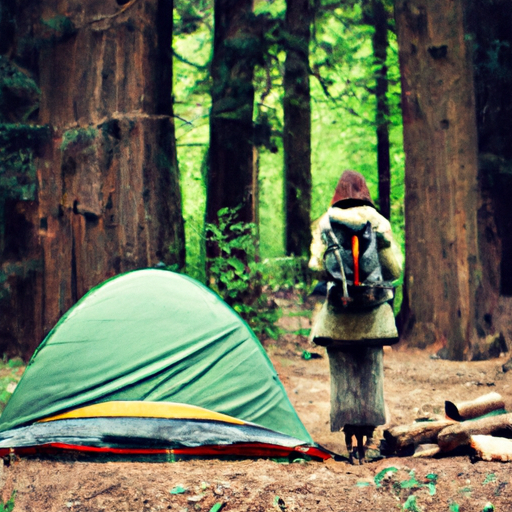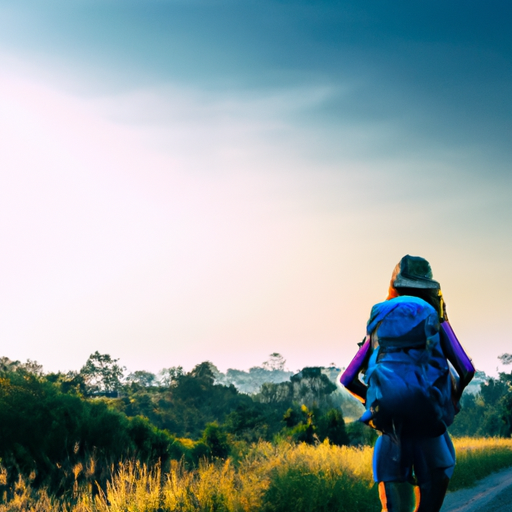Do you love adventure and spending time in the great outdoors? Maybe you’re planning a hiking trip in the mountains or a camping adventure in the wilderness. Whatever your outdoor plans may be, one thing is certain – survival skills are essential. In this article, we are going to cover some essential tips and strategies that will help you navigate the outdoors with confidence and ensure your safety. So, whether you’re a seasoned outdoors enthusiast or a beginner looking to explore nature, read on to learn more about surviving in the wild.
First and foremost, it’s important to be prepared before embarking on any outdoor adventure. Make sure you have the necessary supplies, such as food, water, and a first aid kit. Research the area you will be visiting and familiarize yourself with local wildlife, potential risks, and emergency services. In addition, learn some basic survival skills, such as building a shelter, starting a fire, and navigating using a compass. By taking these steps, you will be better equipped to handle any unexpected situations that may arise during your outdoor adventure.
When venturing into the wild, always remember to prioritize safety. Stay on marked trails and inform someone of your plans, including your expected return time. It’s also advisable to hike or camp with a buddy, as there’s safety in numbers. In case of an emergency, knowing how to signal for help is crucial. This can be done by using a whistle, mirror, or even a fire. Additionally, be mindful of the weather conditions and dress appropriately. Layer your clothing to stay warm and protect yourself from the elements.
Lastly, always be respectful of the environment. Leave no trace by packing out all your trash and avoiding any damage to natural habitats. Be mindful of wildlife and avoid approaching or feeding animals. It’s important to remember that we are guests in their home, and it’s our responsibility to preserve and protect the natural world for future generations to enjoy. By following these essential tips and strategies, you can have a safe and enjoyable outdoor adventure.
In conclusion, survival skills are crucial for any outdoor adventure. By being prepared, prioritizing safety, and respecting the environment, you can ensure a successful and enjoyable trip. So, whether you’re planning a weekend camping trip or a month-long hiking expedition, remember to always be prepared, stay safe, and leave no trace. In the following article, we will delve deeper into each of these topics, providing you with the ultimate guide to surviving in the great outdoors. Stay tuned! Guide: Essential Tips and Strategies for Outdoor Adventures
Are you an outdoor enthusiast or adventure seeker? Do you love exploring the wilderness and challenging yourself in nature? If so, it’s important to be prepared for the unexpected. Whether you’re planning a short camping trip or embarking on a long hiking expedition, having the knowledge and skills to survive in the wild is crucial. In this survival guide, we will walk you through essential tips and strategies to ensure your outdoor adventures are safe and enjoyable.
Preparing for Outdoor Adventures
Before setting off on any outdoor adventure, it is important to thoroughly research and plan your trip. This includes understanding the destination, the weather conditions, and any potential hazards you may face. Take the time to read guidebooks, browse online forums, and talk to experienced individuals who have been to the same location.
Creating a packing checklist is also crucial to ensure you have all the necessary equipment and gear. Consider the duration of your trip, the terrain you will encounter, and the activities you will be participating in. Make sure to include essential items such as a tent, sleeping bag, cooking utensils, navigation tools, and first aid supplies.
Gathering all the essential gear and equipment is the next step in preparing for your outdoor adventure. Invest in high-quality gear that will withstand the challenges of the wilderness. This may include hiking boots, waterproof clothing, a durable backpack, a compass, a map, and a reliable camping stove. Remember, being well-prepared will greatly contribute to your safety and peace of mind during your outdoor adventure.
Navigating and Orientation
Basic navigation techniques are crucial for ensuring that you don’t get lost in the wilderness. Familiarize yourself with map reading, compass navigation, and using natural markers to stay on track. By understanding how to navigate your surroundings, you will be able to find your way even if you encounter unexpected obstacles or weather conditions.
A compass and a map are invaluable tools for wilderness navigation. Learn how to use a compass to determine direction and navigate accurately. Combine this knowledge with map reading skills to plan your routes and identify landmarks. Remember to keep your compass and map in a waterproof case to protect them from the elements.
In addition to using a compass and map, learning how to navigate using natural markers can be extremely helpful. Look for distinctive landmarks such as mountains, rivers, or rock formations that can guide you along your path. By observing your surroundings and using natural markers, you can successfully navigate through unfamiliar terrain.

Building Shelters
Knowing how to build a shelter is essential for your survival in the wilderness. When choosing the right location for your shelter, consider factors such as protection from the elements, accessibility to resources, and visibility for potential rescuers.
Understanding different shelter types will give you options depending on the materials available and the resources you have. Some common shelter types include lean-tos, debris shelters, and tarp shelters. Learn how to construct these shelters using natural materials such as branches, leaves, and rocks. Practice building shelters in different environments to gain experience and confidence.
In emergency situations where time is of the essence, it may be necessary to construct a basic survival shelter. This could be as simple as digging a hole in the ground or using a fallen tree as a makeshift shelter. Remember, the goal is to protect yourself from the elements and stay dry and warm until help arrives.
Finding and Purifying Water
Water is crucial for survival, and knowing how to find and purify it is essential. Before drinking any water in the wilderness, make sure to identify safe water sources. Look for flowing water such as streams or rivers, as stagnant water may be contaminated. Avoid collecting water near sources of pollution or animal activity.
Methods of water purification can vary depending on the resources you have available. Boiling water is the most effective way to kill bacteria and parasites. If boiling is not possible, you can use water purification tablets or a water filtration system. Improvise a filtration system using natural materials such as sand, charcoal, and gravel to remove impurities.
Building a water filtration system can be a life-saving skill in emergency situations. By constructing a makeshift filter using natural materials, you can remove debris and contaminants from the water. Remember to always purify water before drinking to avoid waterborne illnesses.

Fire Starting Techniques
Fire is essential for warmth, cooking, and signaling for help in the wilderness. Collecting dry tinder and firewood is the first step in starting a fire. Look for small, dry materials such as twigs, leaves, and bark to use as tinder. Collect larger pieces of firewood to keep the fire going once it’s lit.
Carrying fire starters and matches is essential for starting a fire quickly and efficiently. Waterproof matches or a lighter should always be included in your survival kit. Additionally, packing fire starters such as cotton balls soaked in petroleum jelly or commercially available fire starters can greatly increase your chances of starting a fire in adverse conditions.
In situations where matches and lighters are not available, you can create fire using friction-based techniques. Learn how to use a fire bow drill, hand drill, or fire plow to generate the heat needed to ignite dry tinder. While these techniques may require practice and patience, they can be effective when other methods fail.
Wilderness Food Foraging
In a survival situation, finding food is essential for your sustenance. However, it is important to have the necessary knowledge and skills to identify edible plants and berries. Familiarize yourself with common edible plants and berries in your area, as well as their seasonality and potential poisonous look-alikes. Remember, foraging for food should only be done when necessary and with proper identification skills.
Hunting and trapping small game can also provide a source of food in the wilderness. Learn how to set up snares, traps, and fishing lines to catch small animals and fish. Make sure to comply with local regulations and ethical guidelines when hunting or trapping.
Fishing and gathering water creatures can also supplement your food supply in the wilderness. Learn how to catch fish using various techniques such as fishing lines, nets, and improvised fishing gear. Additionally, familiarize yourself with gathering techniques for edible water creatures such as crayfish and clams.

Understanding Survival First Aid
Carrying a first aid kit is essential for any outdoor adventure. Make sure your kit includes essential supplies such as bandages, antiseptic ointment, pain medication, and basic medical tools. Familiarize yourself with basic wound care techniques, such as cleaning and dressing wounds properly. Learn how to treat common injuries and illnesses that may occur in the wilderness, such as sprains, cuts, and insect bites.
In addition to carrying a first aid kit, it is important to have knowledge of basic first aid procedures. Take a first aid and CPR course to gain the skills needed to respond to emergencies. Knowing how to perform CPR or treat a severe allergic reaction can be life-saving in critical situations.
Dealing with Wildlife Encounters
Encountering wildlife is a possibility during your outdoor adventures. Avoiding close encounters is the best way to prevent conflicts with animals. Make noise while hiking or walking to alert animals of your presence and give them an opportunity to move away. Keep a safe distance and never approach or feed wild animals.
Understanding animal behavior can help you make informed decisions when encountering wildlife. Learn about the behavior of common animals in your area, such as bears, snakes, and wolves. Knowing how to interpret their body language and signs of aggression can help you react appropriately and avoid dangerous situations.
In the event of an animal attack, it is important to know how to react and handle the situation. Different animals require different responses. For example, if attacked by a bear, play dead and protect your vital organs. If attacked by a mountain lion, fight back aggressively. Knowing the appropriate response can greatly increase your chances of survival.

Survival Communication and Signaling
Communication is crucial in emergency situations. It is important to have means of communication and signaling to alert potential rescuers to your location. Whistles, mirrors, and signals are important tools for signaling for help in remote areas. Carry a whistle on your outdoor adventures and use it in emergencies to alert others of your presence.
Creating and understanding SOS signals is essential for survival communication. SOS signals consist of three short signals, three long signals, and three short signals (· · · – – – · · ·). Learn how to create this signal using various methods, such as using a whistle, a mirror, or by constructing signal fires.
In remote areas without modern means of communication, it is important to know alternative communication techniques. Basic signaling methods such as smoke signals, flags, and improvised signs can help you communicate important information to potential rescuers. By using these techniques, you can increase your chances of being noticed and rescued.
Conclusion
In conclusion, being prepared and having the necessary skills and knowledge is essential for any outdoor adventure. By researching your destination, creating a packing checklist, and gathering essential gear and equipment, you can ensure a safe and enjoyable experience. Understanding navigation techniques, building shelters, finding and purifying water, and knowing how to start a fire are just a few of the many skills that will greatly contribute to your survival in the wilderness. Additionally, familiarizing yourself with wilderness food foraging, first aid, wildlife encounters, communication and signaling, and the importance of preparedness will help ensure your safety and well-being during outdoor adventures. So go out and explore, but always remember to be well-prepared and prioritize safety. Enjoy your outdoor adventures to the fullest, and embrace the excitement and joy that nature has to offer.

